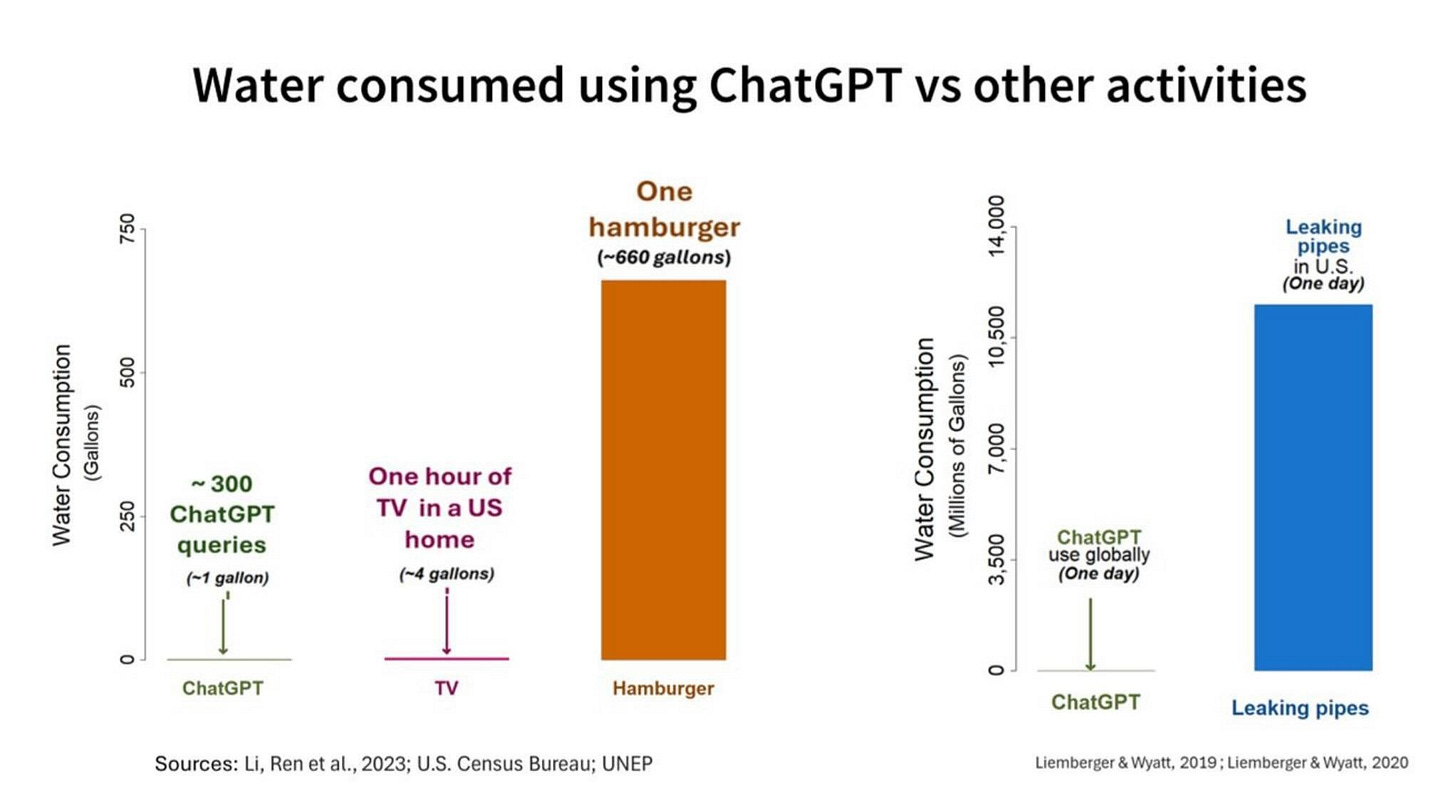Using ChatGPT is not bad for the environment
Unless you've stopped taking showers/baths you can stop worrying about your ChatGPT usage
Unless you never take any baths/showers, nor use a microwave, nor eat meat or milk products, never watch YouTube, in fact don’t do any Google searches, never take any flights (or for that matter, cars), and are 100% sure that there are no leaking pipes in your house, you can stop worrying about how much electricity or water your ChatGPT queries are using because each of those activities are using many times more electricity and water.
A widespread perception is that using ChatGPT is very bad for the environment. Some numbers about the amount of water or electricity consumed are mentioned and those sound scary. But this is a "compared to what" problem.
We are terrible at making sense of absolute numbers and they make much more sense when the numbers are put in context by comparing them to similar numbers from other day-to-day familiar activities.
Here’s a long and detailed article pointing out the following things:
One ChatGPT query most probably uses 0.3 Wh of electricity but to be conservative we’ll assume it takes 3 Wh. That’s 0.003 “units” of electricity. That’s 10 seconds of microwave oven use, 21 seconds of a washing machine usage, 6 minutes of every fan you use, 12 minutes of every energy efficient LED bulb you use (and surely you don’t use an AC at all because that’s in a completely different league.)
Compare the CO₂ emissions of 50000 ChatGPT queries to various other activities you indulge in without really worrying about the environment:
Or maybe you’re worried about water usage?
Do you use any internet. For example to read substack posts written by me? You should be worrying about that more than your ChatGPT usage:
Yes, the total energy consumed by AI is not trivial. ChatGPT is a tiny, tiny fraction of all AI use. 97% of AI usage is not LLMs. It is primarily recommendation systems (i.e. when Amazon shows you related products, Netflix suggests movies, Spotify suggests songs, and in fact, online advertising, which means Google searches and the ads on any website you visit.
And here’s a second article, answering the frequently asked questions and objections about the first article. This has many more interesting points:
By being vegan, I have as much climate impact as not prompting ChatGPT 400,000 times each year (the water impact is even bigger). I don’t think I’m going to come close to prompting ChatGPT 400,000 times in my life, so each year I effectively stop more than a person’s entire lifetime of ChatGPT searches with a single lifestyle change. If I choose not to take a flight to Europe, I save 3,500,000 ChatGPT searches. this is like stopping more than 7 people from searching ChatGPT for their entire lives. Preventing ChatGPT searches is a hopelessly useless lever for the climate movement to try to pull. We have so many tools at our disposal to make the climate better. Why make everyone feel guilt over something that won’t have any impact?
The average American uses about 10,000 times as much energy each day. If each of these dots is one ChatGPT prompt, all the dots together are how much energy you use in one day.
And this:
So read both the articles: original and follow-up. And if you have any objections, please check the articles before you object because most of them have already been discussed.
And go ahead, use ChatGPT even more. If you care about the environment, stop doing one of the other—far more damaging—activities.








One qualification, I don't think it changes the point, should be that all these comparisons are for an average American - the extreme end of carbon footprint scale. Even top 1% Indians will have lower carbon footprints owing to lower flights, driving, and meat consumption.
And more importantly, although individual footprint is negligible, we should push Technology companies to reduce their rising emissions and electricity demand which is becoming critical in regions where they have a major infrastructure presence (northern virginia, ireland).